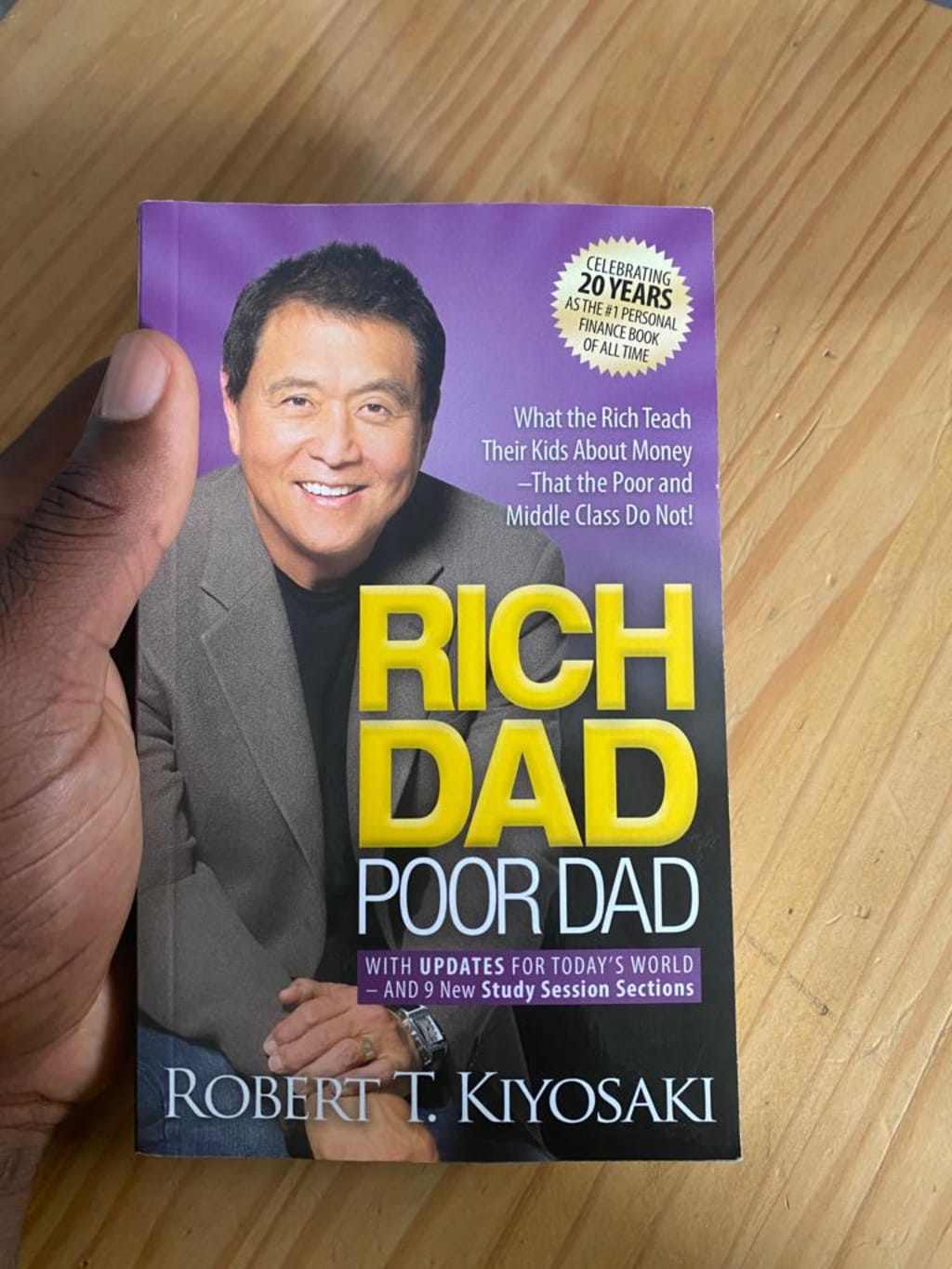Unleashing Financial Wisdom with "Rich Dad Poor Dad"
"Rich Dad Poor Dad" by Robert Kiyosaki

Introduction
"Rich Dad Poor Dad" by Robert Kiyosaki is a renowned personal finance book that has transformed the way many people perceive wealth, money, and financial independence. This article explores the key lessons and insights from the book, highlighting the importance of financial education and mindset shifts to achieve financial success.
Overview of "Rich Dad Poor Dad"
"Rich Dad Poor Dad" is a personal finance classic that recounts the author's upbringing and the contrasting lessons he learned from his two fathers. His biological father, the "poor dad," represents the traditional approach to money, while his friend's father, the "rich dad," embodies a mindset of financial independence and wealth creation. The book delves into various financial principles, anecdotes, and practical advice that challenge conventional wisdom.
Lessons from the Book
"Rich Dad Poor Dad" imparts several valuable lessons that are essential for financial success. Some of the key takeaways include:
Importance of Financial Education: The book emphasizes the significance of financial literacy and education. It advocates learning about money management, investments, and financial strategies to build wealth and achieve financial independence.
Mindset Shift: The book encourages readers to shift their mindset from being employees or self-employed individuals to becoming investors and business owners. It emphasizes the importance of thinking like the wealthy and leveraging opportunities to create wealth.
Assets vs. Liabilities: "Rich Dad Poor Dad" highlights the crucial distinction between assets and liabilities. It emphasizes acquiring income-generating assets that appreciate in value, rather than accumulating liabilities that drain resources.
Building Wealth: The book emphasizes the importance of building wealth through income-generating assets such as real estate, stocks, and businesses. It stresses the significance of long-term investments and passive income streams.
Real Estate Investment: "Rich Dad Poor Dad" places considerable emphasis on real estate as a vehicle for wealth creation. It discusses the benefits of investing in real estate, including cash flow, tax advantages, and potential appreciation.
Entrepreneurship: The book encourages readers to embrace entrepreneurship as a means to financial freedom. It promotes the idea of creating businesses and generating income beyond traditional employment.
Importance of Financial Education
"Rich Dad Poor Dad" underscores the significance of financial education in today's world. The book argues that the lack of financial literacy is a primary reason why many individuals struggle with money management and fail to build wealth. It encourages readers to take control of their financial education, seek knowledge, and apply sound financial principles to achieve financial security and freedom.
Mindset Shift
One of the core themes in "Rich Dad Poor Dad" is the necessity of a mindset shift. The book challenges the traditional belief that job security and a high-paying job equate to financial success. Instead, it promotes a mindset that values financial independence, taking risks, and pursuing opportunities. By shifting one's mindset and embracing a mindset of abundance and opportunity, readers can overcome limiting beliefs and open doors to financial growth.
Assets vs. Liabilities
"Rich Dad Poor Dad" introduces the concept of assets and liabilities and their impact on wealth creation. Assets are defined as income-generating resources that appreciate in value, such as investment properties, stocks, or businesses. Liabilities, on the other hand, are expenses that do not generate income or appreciate, such as consumer debt or excessive personal expenses. The book emphasizes the importance of acquiring income-generating assets while minimizing liabilities to build wealth over time.
Building Wealth
The book offers practical strategies for building wealth and achieving financial independence. It advocates for long-term thinking, disciplined saving and investing, and leveraging the power of compound interest. By focusing on income-generating assets, diversifying investments, and maintaining a solid financial foundation, readers can increase their chances of building long-lasting wealth.
Real Estate Investment
"Rich Dad Poor Dad" places significant emphasis on real estate investment as a wealth-building strategy. The book highlights the advantages of investing in income-generating properties, such as rental homes or commercial real estate. It discusses the potential for cash flow, tax benefits, and long-term appreciation that real estate investments can offer.
Entrepreneurship
Entrepreneurship is another key theme in "Rich Dad Poor Dad." The book encourages readers to embrace the entrepreneurial mindset and consider starting their own businesses. It emphasizes the potential for higher income, flexibility, and the ability to create value and wealth through entrepreneurial ventures.
Criticisms and Controversies
While "Rich Dad Poor Dad" has gained widespread popularity, it has also faced criticism and controversies. Some critics argue that the book oversimplifies financial concepts and promotes risky investment strategies. Additionally, there have been debates regarding the authenticity of the author's personal experiences and the credibility of the stories shared in the book. It is important for readers to approach the book with a critical mindset and seek additional sources for a well-rounded financial education.
Conclusion
"Rich Dad Poor Dad" has made a significant impact on the personal finance landscape by challenging conventional wisdom and advocating for financial literacy, mindset shifts, and strategic wealth-building. By embracing the lessons from this book and adopting a proactive approach to financial education, readers can lay a solid foundation for their financial journey and work towards achieving their financial goals.
FAQs
FAQ #1: Is "Rich Dad Poor Dad" suitable for beginners in personal finance?
Yes, "Rich Dad Poor Dad" is suitable for beginners in personal finance. The book simplifies complex financial concepts and provides a solid foundation for understanding money management, assets, and liabilities.
FAQ #2: Does "Rich Dad Poor Dad" provide specific investment advice?
While "Rich Dad Poor Dad" discusses investment strategies such as real estate, it primarily focuses on fundamental financial principles and mindset shifts. It encourages readers to seek further knowledge and make informed investment decisions based on their individual circumstances.
FAQ #3: Can "Rich Dad Poor Dad" guarantee financial success?
"Rich Dad Poor Dad" provides valuable insights and principles for achieving financial success. However, individual results may vary based on various factors such as personal circumstances, risk tolerance, and market conditions. It is important to apply the book's teachings with careful consideration and seek professional advice when needed.
FAQ #4: Is "Rich Dad Poor Dad" only applicable to a specific audience?
No, "Rich Dad Poor Dad" is applicable to a wide audience. The book's principles and lessons can benefit anyone seeking financial knowledge, regardless of their background or current financial situation.
FAQ #5: Are there any follow-up books or resources recommended for further learning?
Yes, Robert Kiyosaki has authored several follow-up books, such as "Cashflow Quadrant" and "Rich Dad's Guide to Investing," which delve deeper into specific financial topics. Additionally, there are numerous reputable personal finance resources available that can supplement the knowledge gained from "Rich Dad Poor Dad."
About the Creator
Karim Mossa
mmmm






Comments
There are no comments for this story
Be the first to respond and start the conversation.